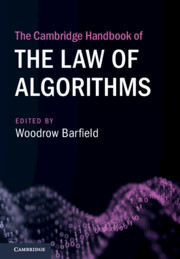Book contents
- The Cambridge Handbook of the Law of Algorithms
- The Cambridge Handbook of the Law of Algorithms
- Copyright page
- Contents
- Figures
- Tables
- Notes on Contributors
- Foreword
- Preface
- Acknowledgements
- Abbreviations
- Part I Introduction and Setting the Stage for a Law of Algorithms
- Part II Business, Regulations, and Decision-Making with Algorithms
- Part III Intellectual Property and Algorithms
- Part IV Criminal Law, Tort Issues, and Algorithms
- Part V Constitutional Law, Human Rights, and Algorithms
- 24 Human Rights-Based Approach to AI and Algorithms
- 25 Four Modes of Speech Protection for Algorithms
- 26 Algorithms and Freedom of Expression
- 27 Artificial Minds in First Amendment Borderlands
- 28 The First Amendment and Algorithms
- 29 Algorithmic Analysis of Social Behavior for Profiling, Ranking, and Assessment
- 30 Algorithmic Stages in Privacy of Data Analytics
- Part VI Applications and Future Directions of Law and Algorithms
- Index
24 - Human Rights-Based Approach to AI and Algorithms
Concerning Welfare Technologies
from Part V - Constitutional Law, Human Rights, and Algorithms
Published online by Cambridge University Press: 19 October 2020
- The Cambridge Handbook of the Law of Algorithms
- The Cambridge Handbook of the Law of Algorithms
- Copyright page
- Contents
- Figures
- Tables
- Notes on Contributors
- Foreword
- Preface
- Acknowledgements
- Abbreviations
- Part I Introduction and Setting the Stage for a Law of Algorithms
- Part II Business, Regulations, and Decision-Making with Algorithms
- Part III Intellectual Property and Algorithms
- Part IV Criminal Law, Tort Issues, and Algorithms
- Part V Constitutional Law, Human Rights, and Algorithms
- 24 Human Rights-Based Approach to AI and Algorithms
- 25 Four Modes of Speech Protection for Algorithms
- 26 Algorithms and Freedom of Expression
- 27 Artificial Minds in First Amendment Borderlands
- 28 The First Amendment and Algorithms
- 29 Algorithmic Analysis of Social Behavior for Profiling, Ranking, and Assessment
- 30 Algorithmic Stages in Privacy of Data Analytics
- Part VI Applications and Future Directions of Law and Algorithms
- Index
Summary
Automated systems that process vast amounts of data about individuals and communities have become a transformative force within contemporary societies and institutions. Governments and businesses, which adopt and develop new techniques of collecting and analyzing information, rely on algorithms in the decision-making process in various sectors: like banking, political marketing, health, and criminal justice. One of the early adopters of the automated systems are also welfare agencies responsible for the distribution of welfare benefits and management of social policies. These new ways of using technology highlight efficiency, standardization, and resource optimization as benefits. However, the debate about artificial intelligence (AI) and algorithms should not be limited to questions about its technical capabilities and functionalities. So too is the creation and implementation of technological innovations a significant normative and ethical challenge for our society. The decision to process data and use certain algorithms is structured and motivated by specific political and economic factors. Therefore, just as argued by Winner, technical artifacts pose political qualities and are far from being neutral.
Keywords
- Type
- Chapter
- Information
- The Cambridge Handbook of the Law of Algorithms , pp. 517 - 542Publisher: Cambridge University PressPrint publication year: 2020



